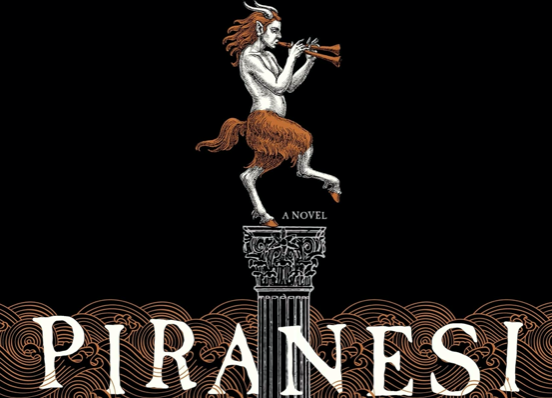communicate the incommunicable —
After more than a decade away, the fantasy author is back with Piranesi.
Jason Kehe, Wired.com
–

Jonathan Strange & Mr Norrell fans, it’s a good fall.
Do fairies exist? To steal us away, to cast curses, to impurify our bloodlines? Let’s say yes. We have artists, don’t we? Sensitive types, so fragile and retreating. The best of them seem touched by an otherness, an otherlandishness, of being. Maybe a small part of their humanity was bargained away without their knowing. A pinky finger. A left eyeball. That’s why they don’t stomp through the world as the rest of us do, very loudly. On those rare occasions when they’re seen to leave their homes, they sort of flicker—fairly float—across the way. Whatever you do, don’t startle the fairy-people, or you’ll scare them off. Just look at what befell Susanna Clarke.
In 2004, Clarke published what can only be described as her first dispatch from the land of Faerie. Ten years in the making and 846 (footnoted!) pages long, Jonathan Strange & Mr Norrell was ethnography, lore. It was as if she’d been there, to England, at the time of Napoleon, when those two infamous magicians, the bookworm Norrell and his perky pupil Strange, tapped into unearthly powers to impress politicians, move mountains, and defeat the French. That’s not how it happened, you say? Why, yes it is. You simply haven’t read your hidden history.

The events that followed only proved Clarke’s preternatural pedigree. After the publication, in 2006, of The Ladies of Grace Adieu and Other Stories, a collection of fairy tales written around the same time, and in the same world, as Strange & Norrell, Clarke went poof. Yumpy. Far, far away. For 14 years. The official story was debilitating mental illness—housebound, couldn’t write—but clearly her fairy patrons had come for her, to reclaim their erstwhile princess. Or else they meant to punish Clarke for her betrayal, for spilling their precious secrets, by enfuzzing her beautiful brain. Something like that. The ways and reasons of the Fae are little known to common folk.
If this strikes you as cutesy, tidy, annoying, even a bit disturbing, a romanticization or fancification of what sounds like a period of immense torture for Clarke and her loved ones, consider their own words. “It was as though she’d been captured into the land of Faerie, as if she had been taken away from us,” Clarke’s editor told New York magazine. Clarke herself, in a rare interview, told The New Yorker, “You really shouldn’t annoy fairies, or writeabout them—they don’t like it very much.” Given that Clarke has now released a second dispatch from Faerie, called Piranesi, which plunges far deeper than Strange & Norrell ever did into those forbidden fortresses from which the un-mad and mortal among us are forever barred, perhaps there’s no better explanation. Clarke has indeed been there and back again.
Mirrors help
In Strange & Norrell, Clarke reports on the various ways an enterprising soul might make it to the fairy realm, which is located, difficultly, “behind the sky” and “on the other side of the rain.” Mirrors help, if you know the enchantment; if you don’t, make friends with an evil fairy king who desires your soul. Whatever it takes, because Faerie is the wellspring of magic, magic which seems to have trickled out of England sometime in the 1500s.
Three centuries later, Gilbert Norrell rolls up, bewigged and less than bemused, to bring it back. “To restore,” as he likes to put it, “English magic.” An obsessive-compulsive hoarder of arcane spellbooks, he alone possesses the know-how, until a young country woman demands of her dissolute boyfriend that he shape up and find a job. Thus Jonathan Strange becomes England’s second working magician. He and Norrell pass through stages of friendship and enemyship and eventually settle on something like frenemyship. Elder and upstart, conservative and liberal, scholar and seeker, loner and lover—they’re your classic dyad, two halves making a whole.
One irksome point of contention between these boys: Norrell won’t give Strange directions to Faerie, so Strange must hack together a DIY solution. It’s not pretty, this process, for it involves cooking a decrepit old cat lady down into the essence of her crazy. Tastes something unspeakable, but if fairies are “barely sane” by human standards, Strange reasons, then to reach them one must get, as it were, on their level. In the end, Clarke’s book really isn’t about the restoration of English magic. It’s about the restoration of English madness.
Madness, for Clarke as for so many of her fellow fairy-folk over the ages, confers certain compensations. “It used to be well known that when fairies hid themselves from general sight,” Clarke writes, “lunatics were often able to perceive them.” (Strange discovers this when the King of England, blind and batshit, makes effortless conversation with the fairy king.) The olden-time mages, she adds, “regarded madmen as seers and prophets and listened to their ramblings with the closest attention.” For all its agonies, madness awakens in its sufferers the gift of fairy sight, access to those deepest truths covered up by centuries of mannish toil and industry.
The only possible conclusion is: Clarke is writing from experience. There’s stuff in Strange & Norrell no normie could know, like the secret ingredient of regret-colored pigment (“the tears of spinsters of good family, who must live long lives of impeccable virtue and die without ever having had a day of true happiness”). Or the meaning of a rose at one’s lips. Or the way a fairy sublimely sings. “The world is not dumb at all, but merely waiting for someone to speak to it in a language it understands,” Clarke writes. “In the fairy’s song the earth recognized the names by which it called itself.” Here’s a writer who is at her most lucid precisely when she’s articulating the highest insanities. If not quite a defense of madness, Strange & Norrell is an argument for at least a little more of it in the modern world. More freakiness. More fairyness. When Strange quaffs a safer titration of his crazy potion, he doesn’t crack up. Instead, he journeys within: “He found that he no longer cared very much about magic. Doors slammed in his mind and he went wandering off into rooms and hallways inside himself that he had not visited in years.”
This was to be the very thing Clarke would do, in the addled years spent thinking about, and then writing, Piranesi.
Magic has long been extinct
Giovanni Battista Piranesi was a mid-18th-century Italian artist, best known for his black-and-white, proto-Escherian etchings of fantastical architectures, particularly his Prisons series. Clarke must be a fan. She mentions Piranesi in both Strange & Norrell and Ladies of Grace Adieu, and Piranesi prints are glimpsed in the 2015 BBC adaptation of the former. His work conjures the giddy terror of being caught in a good maze, like Norrell’s twisting manor, or the land of Faerie.

Amazon / Bloomsbury
The Piranesi of Clarke’s new novel, its narrator and main character, is not an artist, but he is a man trapped in an infinite megastructure. Fabulous and frightening, Piranesi calls it “the House” but also, at times, “the World”—“since the two are for all practical purposes identical,” he says. One is made to think of Jorge Luis Borges, who must be Clarke’s fairy godfather. Like the House, Borges’ labyrinths exist ab aeterno and are, for all practical purposes, the universe.
Piranesi isn’t the narrator’s real name; that’s only what his warder, known as the Other, calls him. As far as we can tell, Piranesi and the Other are the sole inhabitants of the House. Meaning the only two people in the entire world. The House is all they know: its endless statue-strewn rooms and the pelagic waters that periodically flood them. This is not, in other words, the 19th-century Europe of Strange & Norrell (even if it, too, concerns a manly dyad). In fact, the House is not of this earth at all. Though we meet no actual fairies in Piranesi, it must be to their otherworldly realm that these souls have been banished.
Piranesi is a mystery, a mystery of the mind, a way for Clarke to communicate the incommunicable. What is this place? Why is Piranesi, so wonderstruck and innocent, stuck there? Reading it, one can’t help but imagine its origins in Clarke’s own life, the years she spent sick, dissociating, wandering the rooms and hallways, Strange-like, inside her head. “The labyrinth plays tricks on the mind,” the Other tells Piranesi. “If you’re not careful it can unpick your entire personality.” A devastating verb, unpick. Something a fairy might do, come to think, with a scalpel of unimaginable delicacy. Which Clarke would have felt, surely, throughout that decade-plus in private lockdown, always at the intimate mercy of its blade.
After everything Clarke has endured, one might expect her to hate fairy guts, to make these conniving, tyrannical creatures, and the madness for which they are metaphors, the ultimate enemy. She won’t. She refuses. Because to do so would be to lose: herself and everything else. As the tragedy of Piranesi’s circumstances unfogs, he holds fast to brightness, the treasures acquired along the way. For he knows the miracles madness makes, whose names are whimsy and wonder. “Magic has long been extinct in these islands,” as Jonathan Strange once lamented, speaking of his world as well as our own. To which he could’ve added, as Clarke writes in Piranesi: “Once, men and women were able to turn themselves into eagles and fly immense distances. They communed with rivers and mountains and received wisdom from them. They felt the turning of the stars inside their own minds.”
That Susanna Clarke has done and felt such things, these turnings and communions, falls somewhere in the realm of absolute truth. A blessed being, she has performed the long-lost miracles, and she has lived, more miraculous still, to tell the tale. With great effort, she has un-unpicked her personality and returned to this world, our Earth, so that the rest of us might know her exquisite burden. Welcome back, Fairy Mistress, if only for a spell! We are grateful to you, oh yes, but we mourn you a little, too—that you must work so hard to be human.
This story first appeared at wired.com.

